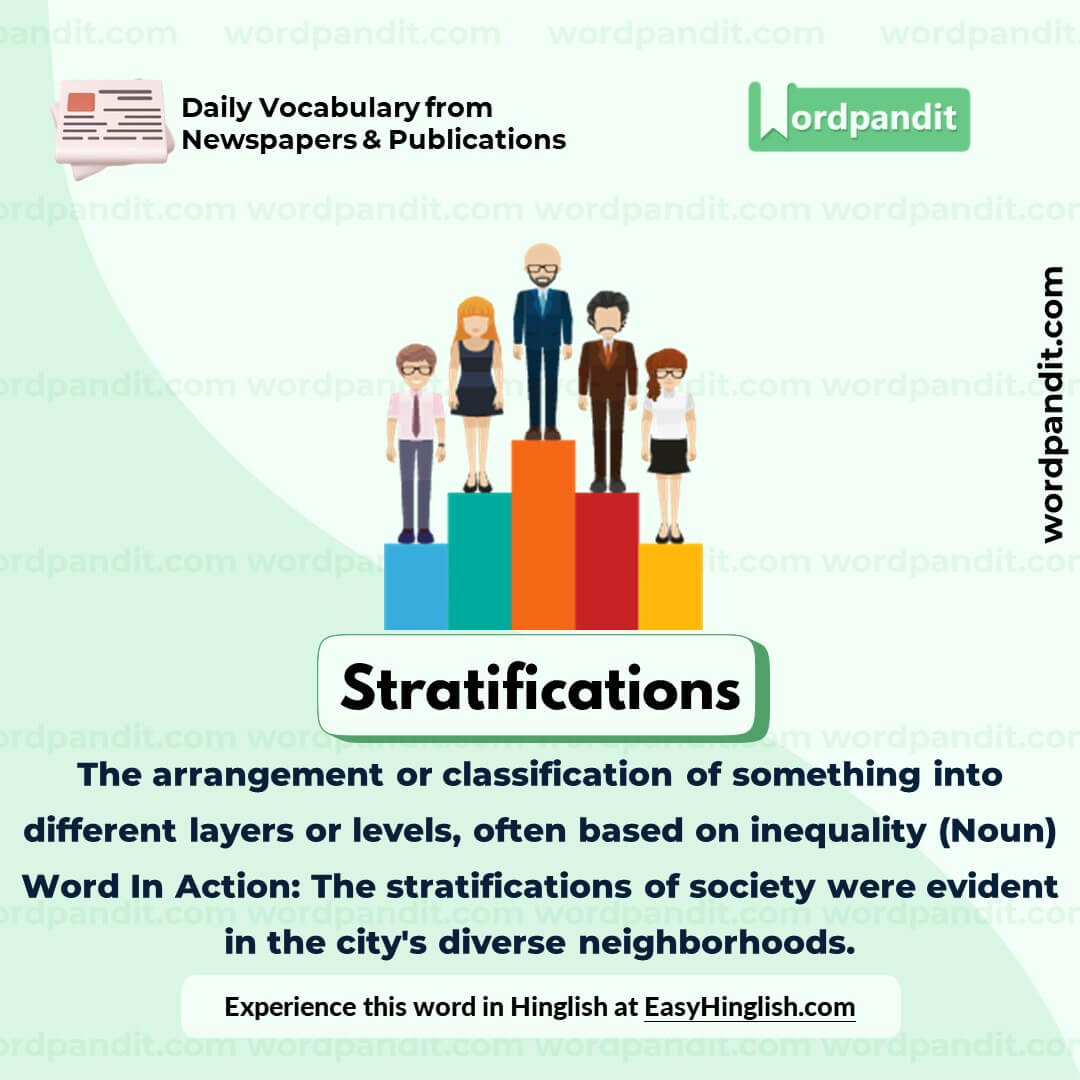Daily Vocabulary from Indian Newspapers and Publications
Welcome to Wordpandit’s Indian Vocabulary Hub
At Wordpandit, we understand the importance of staying rooted in the local context while expanding your language skills. This section focuses on enriching your vocabulary with words and phrases drawn from India’s leading newspapers and publications, ensuring you're learning vocabulary that is practical, relevant, and uniquely Indian.
Why Indian Sources Matter
We believe that the best way to master any language is by immersing yourself in local content. That’s why we carefully curate vocabulary from top Indian publications, including:
- The Hindu
- The Times of India
- The Economic Times
- Hindustan Times
- Live Mint
- The Indian Express
- And many others...
Stay Updated, Stay Relevant
With daily updates from Indian news sources, you’ll be consistently learning words that reflect the trends and shifts in Indian society and culture. Our focus is to provide vocabulary that enhances your understanding of the language in an Indian context.
How Wordpandit Supports Your Goals
Whether you’re preparing for exams, aiming to improve your professional communication, or simply want to stay connected with the latest Indian vocabulary, Wordpandit is here to guide you every step of the way.
Learn with a Practical Approach
Our interactive learning methodology includes real-world examples, engaging activities, and context-specific usage to ensure that every word becomes part of your active vocabulary.
Dive into Indian Vocabulary Today!
Why Choose Wordpandit?
Practical Learning: Focus on words you'll actually encounter in real-world reading, enhancing your comprehension and communication skills.
Diverse Content: From current affairs to scientific breakthroughs, our varied sources expose you to vocabulary across multiple domains.
Effortless Integration: Make Wordpandit a part of your daily routine. Just a few minutes each day can significantly boost your lexicon over time.
Your Path to Vocabulary Mastery
- Visit our Daily Vocabulary section regularly
- Explore new words and their usage in context
- Practice incorporating these words into your own writing and speech
- Track your progress as your vocabulary expands
Start Your Journey Today
Embark on your vocabulary enhancement journey with Wordpandit. By consistently engaging with our daily posts, you'll build a robust vocabulary that serves you well in academic, professional, and personal contexts.
Remember, a word a day keeps linguistic limitations at bay. Make Wordpandit your daily companion in the quest for vocabulary excellence!
WORD-1: Heaping
Context:
"Hindu Maha Sabha – heaping hatred and venom on him for his role in drafting the constitution and the Hindu Code Bill, the latter for progressive reforms of the personal laws governing the Hindus and people of other faiths such as Buddhism, Sikhism and Jainism." - The Wire
Explanatory Paragraph:
The term "heaping" is often used metaphorically to describe the act of piling up something in large quantities, whether tangible or intangible. In this context, it refers to an overwhelming and excessive outpouring of emotions like hatred or criticism directed at someone. The word vividly conveys the intensity and abundance of what is being given or expressed.
Meaning: To pile up or give a large amount of something, often with intensity or exaggeration. (Verb)
Pronunciation: hee-ping
Difficulty Level: ⭐⭐⭐ Intermediate
Etymology: Derived from the Old English word "hēapian," meaning to pile up or accumulate, related to "hēap," meaning a heap or a pile.
Synonyms & Antonyms:
Synonyms: piling, accumulating, amassing, showering
Antonyms: reducing, lessening, depleting, scattering
Usage Examples:
- The critics were heaping praise on the actor for his stellar performance.
- The teacher heaped scorn on the students who failed to complete their assignments.
- She heaped her plate with delicious food at the buffet.
- The coach heaped encouragement on the team before the final match.
Cultural Reference:
"Heaping coals of fire on someone’s head" is a biblical phrase found in Romans 12:20, which refers to showing kindness to those who mistreat you, thereby inducing guilt and reflection in them. - The Bible
Think About It:
Can "heaping" ever have a neutral connotation, or is it always loaded with emotional intensity?
Quick Activity:
Write a short paragraph describing a situation where someone was "heaping" either praise or criticism on another person. Use the word in context.
Memory Tip:
Imagine a literal heap of something, like a pile of dirt or treasure. Visualizing this abundance can help you remember that "heaping" means giving or piling up something in large amounts.
Real-World Application:
"Heaping" is commonly used in both casual and formal contexts to emphasize the intensity of actions or feelings, such as heaping compliments in a workplace or heaping criticism in public discourse.
WORD-2: Manifest
Context:
"Ambedkar were very sharply attacked for their initiatives and it was best manifested by Ramnarayan Singh who said that the personal laws of Hindus flowed from the Vedas and Vedic religion which withstood the challenges." - The Wire
Explanatory Paragraph:
The word "manifest" means to make something clear or evident to the eye or understanding. It is used to describe how ideas, emotions, or phenomena become visible, tangible, or easily perceived. In the given context, "manifested" is used to illustrate how the criticisms were clearly demonstrated or expressed through a specific individual’s remarks.
Meaning: To show, reveal, or display clearly and evidently. (Verb)
Pronunciation: man-uh-fest
Difficulty Level: ⭐⭐⭐ Intermediate
Etymology: From the Latin word "manifestus," meaning "clear" or "obvious," combining "manus" (hand) and "festus" (struck or palpable).
Synonyms & Antonyms:
Synonyms: demonstrate, exhibit, display, express, reveal
Antonyms: conceal, hide, obscure, mask
Usage Examples:
- The artist’s emotions were manifest in her vibrant paintings.
- The manager's frustration was manifest in his stern tone and gestures.
- The disease often manifests itself through subtle symptoms that go unnoticed at first.
- Her dedication to the project was manifest in the hours she spent perfecting every detail.
Cultural Reference:
"Manifest Destiny" was a 19th-century ideology in the United States that justified the expansion of territory, often symbolizing the belief that this expansion was clear, inevitable, and divinely ordained. - Historical Context
Think About It:
How do you think emotions manifest differently in individuals based on cultural or personal upbringing?
Quick Activity:
Think of a situation where your emotions or thoughts were clearly "manifested" through your actions. Write a few lines describing how this happened.
Memory Tip:
Remember "manifest" by thinking of a "manifest" document on a ship, which clearly lists everything on board, making things visible and apparent.
Real-World Application:
The term "manifest" is frequently used in psychological contexts to describe how inner feelings or subconscious thoughts become evident through actions, body language, or behaviors.
WORD-3: Recalibrate
Context:
"Different system, and found it hard to recalibrate themselves in classrooms, teaching as they were." - The Wire
Explanatory Paragraph:
The word "recalibrate" refers to adjusting or modifying something to bring it into proper alignment or functionality, often after a change or disruption. It is frequently used in both literal and metaphorical contexts, such as fine-tuning a machine or adapting one’s mindset or methods to suit new circumstances. In the given context, it describes the difficulty of adapting to a new teaching environment.
Meaning: To readjust or make corrections to a system, process, or method to ensure it functions properly. (Verb)
Pronunciation: ree-cal-uh-brayt
Difficulty Level: ⭐⭐⭐⭐ Advanced
Etymology: From the prefix "re-" (again) and "calibrate," derived from "calibre," which originally referred to the measurement of a gun barrel’s diameter.
Synonyms & Antonyms:
Synonyms: readjust, realign, reconfigure, modify
Antonyms: ignore, neglect, stagnate
Usage Examples:
- After the policy change, the team had to recalibrate their strategies to meet the new goals.
- The scientist recalibrated the equipment to ensure accurate measurements.
- Following the pandemic, many educators had to recalibrate their teaching methods for online learning.
- The company decided to recalibrate its marketing campaign to target a younger audience.
Cultural Reference:
"Recalibrate" is often used in the context of NASA and other space agencies, where precision instruments need recalibration to function accurately in extreme environments like space. - Space Exploration
Think About It:
Why do you think recalibrating mindsets or behaviors is harder than recalibrating machines or systems?
Quick Activity:
Identify one area of your life where you feel the need to "recalibrate" and write down three steps to achieve it.
Memory Tip:
Think of recalibrating as hitting the "reset" button on a device, fine-tuning it so it works better or adapts to a new situation.
Real-World Application:
The term "recalibrate" is widely used in personal development, technology, and education to describe the process of making adjustments for better performance or to meet new challenges.
WORD-4: Demeanour
Context:
"Apart from his pleasingly courteous demeanour during our meeting, his erudite and sagacious speech at the conference won my admiration and gratitude." - The Indian Express
Explanatory Paragraph:
The word "demeanour" refers to the way a person behaves, appears, or conducts themselves in various situations. It encompasses one's attitude, mannerisms, and the impression they create on others. In the context of the sentence, it highlights the courteous and refined behavior of the individual.
Meaning: Behavior or outward manner (noun)
Pronunciation: dih-MEE-nur
Difficulty Level: ⭐⭐⭐ Intermediate
Etymology: Derived from the Middle English word "demean" (to behave) and from the Old French word "demener," meaning "to lead" or "conduct."
Synonyms & Antonyms:
Synonyms: Behavior, conduct, bearing, manner, deportment
Antonyms: Disrespect, misbehavior, impropriety
Usage Examples:
- Her calm and composed demeanour during the crisis inspired confidence in her team.
- The politician's arrogant demeanour alienated many of his supporters.
- Despite the challenges, his cheerful demeanour remained unchanged.
- The teacher's stern demeanour ensured discipline in the classroom.
Cultural Reference:
"Demeanour" is often highlighted in literature and films to emphasize a character's personality or role. For instance, Mr. Darcy's reserved demeanour in Jane Austen's *Pride and Prejudice* initially creates misunderstandings about his true character.
Think About It:
How does a person's demeanour influence your perception of their personality, and can it sometimes be misleading?
Quick Activity:
Observe a public figure’s demeanor during an interview or speech. Write a brief paragraph describing how their mannerisms influenced your opinion of them.
Memory Tip:
Think of "demeanour" as the way someone "means" to project themselves to the world through their behavior.
Real-World Application:
Understanding someone's demeanour is essential in various fields such as customer service, leadership, and counseling, where interpersonal interactions play a crucial role.
WORD-5: Stratifications
Context:
"Explaining its far-reaching significance for our society marked by entrenched inegalitarian features and rigid caste stratifications representing, in his words, 'graded social inequality.'" - New Indian Express
Explanatory Paragraph:
The word "stratifications" refers to the division or arrangement of something, such as society, into hierarchical layers or levels based on certain criteria, such as wealth, caste, or social status. In the context provided, it highlights the rigid social divisions and systemic inequalities present in a caste-based society, where social mobility is often restricted.
Meaning: The arrangement or classification of something into different layers or levels, often based on inequality. (Noun)
Pronunciation: strat-uh-fi-kay-shuns
Difficulty Level: ⭐⭐⭐⭐ Advanced
Etymology: From the Latin word "stratum," meaning "layer," combined with the suffix "-fication," indicating the action or process of making layers.
Synonyms & Antonyms:
Synonyms: layering, segmentation, hierarchy, division
Antonyms: equality, uniformity, sameness, homogeneity
Usage Examples:
- The sociologist studied the stratifications within urban communities to understand their economic disparities.
- Caste stratifications in rural areas often limit opportunities for marginalized groups.
- The report highlighted the stratifications in healthcare access between different income levels.
- The education system exhibits clear stratifications based on socio-economic status.
Cultural Reference:
In geological terms, "stratification" refers to the layering of rocks, a concept adopted in sociology by thinkers like Karl Marx to describe class structures in society. - Sociological Theory
Think About It:
How do modern institutions perpetuate or challenge social stratifications, and what role can individuals play in fostering equality?
Quick Activity:
Identify one example of stratification in your daily life (e.g., in education, workplace, or community). Write a brief description of its impact.
Memory Tip:
Think of a "strata" cake, with its visible layers, to remember that "stratifications" refers to divisions into layers or levels.
Real-World Application:
Understanding social stratifications is essential in addressing systemic inequalities in fields like policymaking, education, and economics, ensuring a more equitable society.
















